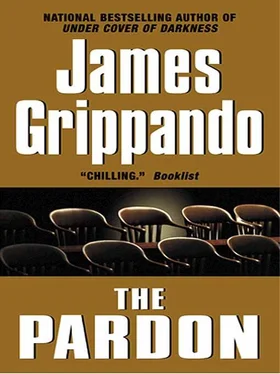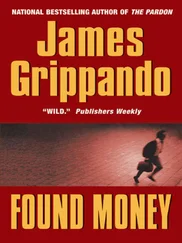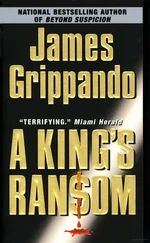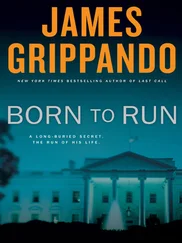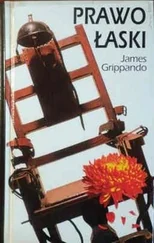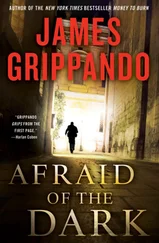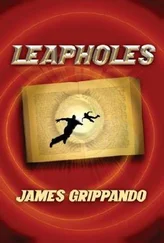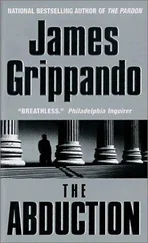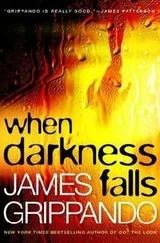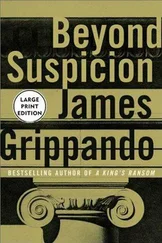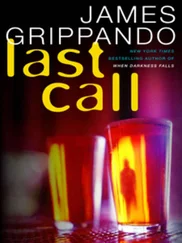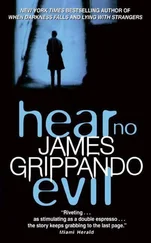James Grippando - The Pardon
Здесь есть возможность читать онлайн «James Grippando - The Pardon» весь текст электронной книги совершенно бесплатно (целиком полную версию без сокращений). В некоторых случаях можно слушать аудио, скачать через торрент в формате fb2 и присутствует краткое содержание. Жанр: Триллер, на английском языке. Описание произведения, (предисловие) а так же отзывы посетителей доступны на портале библиотеки ЛибКат.
- Название:The Pardon
- Автор:
- Жанр:
- Год:неизвестен
- ISBN:нет данных
- Рейтинг книги:3 / 5. Голосов: 1
-
Избранное:Добавить в избранное
- Отзывы:
-
Ваша оценка:
- 60
- 1
- 2
- 3
- 4
- 5
The Pardon: краткое содержание, описание и аннотация
Предлагаем к чтению аннотацию, описание, краткое содержание или предисловие (зависит от того, что написал сам автор книги «The Pardon»). Если вы не нашли необходимую информацию о книге — напишите в комментариях, мы постараемся отыскать её.
The Pardon — читать онлайн бесплатно полную книгу (весь текст) целиком
Ниже представлен текст книги, разбитый по страницам. Система сохранения места последней прочитанной страницы, позволяет с удобством читать онлайн бесплатно книгу «The Pardon», без необходимости каждый раз заново искать на чём Вы остановились. Поставьте закладку, и сможете в любой момент перейти на страницу, на которой закончили чтение.
Интервал:
Закладка:
“As the evidence in this case unfolds, ladies and gentlemen, you will come to know a man who did indeed take that power into his own hands. This man was a lawyer. A lawyer who had devoted his professional life to defending men and women who were accused of some of the most violent murders this community has ever seen. Most, if not all, of his clients were guilty. A few were convicted. Now, there’s nothing wrong with that. Some lawyers would say it’s even admirable to defend the rights of the guilty. It’s in the public interest, they might argue.”
McCue moved closer to the jury, addressing each of the twelve as individuals, as if it were just the two of them sitting on his front porch, sipping lemonade and watching the sun set. “But it’s not the public interest or even this lawyer’s public service that is at issue here,” he said in a low but firm voice. “You are here as jurors today because this lawyer,” his voice grew louder, “the defendant in this case, has a private side-a very dark private side. The evidence will show that on August second, at roughly four o’clock in the morning, he burst into an apartment-another man’s home-and made himself judge, jury, and executioner. He took out his thirty-eight-caliber pistol, fired off two quick shots, and slew his own client. And ladies and gentlemen, the defendant-the man who did this deed-is sitting right here in this courtroom,” McCue said solemnly, scowling as he pointed an accusing finger. “His name is Jack Swyteck.”
Jack suddenly felt the weight of the government’s case, as if McCue’s pointed finger had brought it to rest on his shoulders at that very moment. How true it all sounds! he thought morosely as the hallowed courtroom seemed to transform even this blowhard state attorney into something dignified, the way dirt becomes soil just because it’s in a nursery, or spit becomes saliva when in a dentist’s office.
“You have fifteen seconds left,” the judge intoned.
“My time is short,” McCue grumbled, “and I don’t have nearly enough to lay out all the evidence against Mr. Swyteck. But you will see and hear all of it over the next several days. And at the end of the case, I will come back before you-and then I will ask you to find Jack Swyteck guilty of murder in the first degree.”
McCue paused, the silence in the room seeming to reinforce his words. Then he headed back to his seat.
Manny rose and stepped toward the jury, exchanging glances with McCue as he passed. Manny stood comfortably before the jury, made eye contact with each of the jurors, and then held up the indictment in one hand and read loudly: “ The State versus Jack Swyteck. ” He let his hand fall to his side, still clutching the indictment. “The State,” he repeated, this time with emphasis, “versus Jack Swyteck. Now, that ,” he said, his resonant voice making his audience shiver, “is power. And Mr. McCue is right in one respect: This case is about power. And what you have seen so far is simply the power to accuse,” he said as he flipped the indictment irreverently on the prosecutor’s table, then faced the jury squarely. “Because that’s all an indictment is, ladies and gentlemen: an accusation. In a criminal case, the government has no power. It has only a burden. It has the burden of proving its case beyond a reasonable doubt. Over the next few weeks, the testimony, the evidence, the facts ,” he hung on the last word, “will show you that the government is powerless to meet that heavy burden. . because Jack Swyteck is an innocent man.”
Jack’s gut twitched. Just how innocent did he have to be, he wondered. Just how much would this jury make McCue prove? Jack knew that his lawyer would address all those things in his opening statement, and he wanted to hear every word of it. But he was having trouble focusing. McCue hadn’t said anything that he hadn’t expected him to say, but finally hearing the accusations directly from the prosecutor’s mouth had deeply affected him. It was as if Jack had convinced himself that the prosecutor didn’t really have any evidence, and now he had to deal with the fact that McCue just might have all the evidence he needed.
“And when you evaluate the testimony of the government witnesses,” Manny told the jurors, “remember that not a single one of these witnesses saw my client commit a crime. The government’s case is based entirely on circumstantial evidence: Not a single government witness will say they saw Mr. Swyteck do anything illegal with their own two eyes.”
Jack scanned the courtroom. All eyes were on Manny except. . What was it? He looked around again, more slowly this time, focusing. There it was. A man seated in the last row of public seating was staring at him-not the way a curious observer would stare, but in a penetrating, communicative way. He looked familiar. Tall and broad-shouldered. A very round, clean-shaven head. The sparkle of a diamond stud on his left earlobe. And then the image of the man merged with another. Jack could see himself standing outside Goss’s apartment on the night Goss was killed. He was pounding on the door. A man had stepped into the hall, a few doors down from Goss’s apartment, and shouted, “Cut the racket.” Without question, this was that same man.
Jack quickly looked away from the man. He tried to listen to Manny’s opening statement but couldn’t keep his concentration. What the hell’s that guy doing here? he asked himself. It seemed odd that Goss’s neighbor would be in the courtroom. He could have been a compelling witness for the prosecution. He could identify Jack and place him at the scene of the crime. But he obviously wasn’t going to be a witness. As a lawyer, Jack knew that the rules of court prevented potential witnesses from being in the courtroom at any time before they testified. He glanced again at the man. The cold, unnerving look in his eye was definitely one of recognition, which only increased Jack’s confusion.
The next thing he knew he was hearing Manny say “Thank you very much,” to the jury. He couldn’t believe it! He pried his tight, starched collar from his throat and sighed. After weeks of anticipation, he’d missed his own lawyer’s opening statement. But it didn’t seem to matter. Curiosity now consumed him. Who was that guy?
“Ladies and gentlemen,” said the judge, “we will break for the weekend now. But due to the inordinate amount of publicity attending this trial, I am exercising my prerogative to sequester the jury. The jurors should check with the clerk about accommodations. Thank you. Court’s in recess until nine o’clock Monday morning,” she announced, banging her gavel.
Jack rose quickly as the shuffle and murmur of spectators and reporters filled the courtroom. He didn’t wait for Manny to offer him a ride home. “I gotta get out of here,” he said, his eye still on the man in the last row. “Can you keep the press busy while I duck out and find a cab?”
“Sure,” said Manny as he closed his briefcase. “But what’s the rush?”
“There’s something I have to check out,” he said, giving Manny no time to ask what. He quickly stepped away and passed through the swinging gate that separated the lawyers from the audience, pushing his way through the crowded aisle and ignoring calls from reporters. Manny was a few steps behind. With his height Jack could see over the crowd just well enough to keep a bead on the back of the man’s shaved head.
“I’ll take all your questions right over here,” Jack heard Manny announce as the crowd poured from the courtroom into the lobby. Most of the reporters moved in one direction, and Jack immediately went the other way, toward the elevator, where the clean-shaven head was just then passing through the open doors of a packed car, going down. Jack dashed through the maze of lawyers, reporters, and spectators, trying to keep his target in sight. A couple of reporters tagged along, persisting with their probing questions. He was just ten feet from the closing elevator doors when he broad-sided a blur of pin-striped polyester, a five-foot-tall personal-injury lawyer with files tucked under both arms. The collision sent papers flying and bodies sprawling, like the violent end of a bowling lane.
Читать дальшеИнтервал:
Закладка:
Похожие книги на «The Pardon»
Представляем Вашему вниманию похожие книги на «The Pardon» списком для выбора. Мы отобрали схожую по названию и смыслу литературу в надежде предоставить читателям больше вариантов отыскать новые, интересные, ещё непрочитанные произведения.
Обсуждение, отзывы о книге «The Pardon» и просто собственные мнения читателей. Оставьте ваши комментарии, напишите, что Вы думаете о произведении, его смысле или главных героях. Укажите что конкретно понравилось, а что нет, и почему Вы так считаете.
